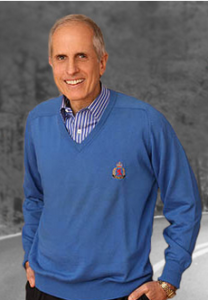
Michael J. Critelli grew up in Rochester, New York. He graduated from Bishop Kearney High School in 1966 and the University of Wisconsin with a B.A. in political science and communications in 1970, then graduated from Harvard Law School with a J.D. cum laude in 1974.
Prior to joining Pitney Bowes as a Counsel in 1979, Mike was an associate at two Chicago law firms. At Pitney Bowes, he became the Company’s General Counsel in 1988 and added responsibility for its human resources functions in 1990, functions he jointly led until 1993. Mike became the Company’s CEO in 1996 during a period in which the Company and the mailing industry underwent transformational change. Under him, Pitney Bowes was named one of America’s most ethical companies, and was ranked as one of America’s most innovative companies and in the top 200 of patents issued. During his tenure Pitney Bowes exited its office systems and external finance businesses and completed over 80 acquisitions to build strength in software, services and international operations. Through a combination of acquisitions and organic investments, the Company diversified into adjacent “mail stream” market spaces.
Mike was directly engaged in the development, release and marketing of Relia-Vote, Pitney Bowes’ voting-by-mail offering, and advocated its use with election officials in many states. He was awarded one patent on a feature that detected ballot fraud. He also acquired and helped develop a Company business that scanned and recognized handwritten documents and envelopes at high speed.
Between 2001 and 2005, Mike co-led the Mailing Industry Task Force, along with Deputy Postmaster General John Nolan, to enable the U.S. Postal Service to work with the private sector on a variety of initiatives, and was heavily used as an industry spokesperson during the 2001 anthrax bioterrorism incidents. He also chaired the Mailing Industry CEO Council, which was an advocate for comprehensive postal reform, an effort resulting in the passage of the Postal Accountability and Enhancement Act of 2006.
Mike retired from his position as Executive Chairman of Pitney Bowes in 2008. He currently is the CEO and co-founder of MoveFlux Corporation, and is a member of the advisory boards of RAND Health, the TH Chan Harvard School of Public Health, and Wellville, a non-profit focused on getting innovative population health initiatives deployed in five communities. He has been a member of the Board of Eaton Corporation, a leading global power management company, since 1998.
Mike joined the DMA in 2019, and with his wide experience and knowledge of the mailing industry it is appropriate that he will address and discuss one of the major issues being faced in this election season – voting by mail.

Lori Swetlin currently holds a tenured Sales Executive and Consulting position at Bluecrest Inc., formerly the Document Messaging Technologies Division of Pitney Bowes. She will join Mike in discussing some of the newer technology tools she has successfully deployed with cutting-edge election administrators and her work with the Postal Service on products of particular value for voting-by-mail.
She currently leads BlueCrest nationally in implementing “soup to nuts” processing and tracking of mail pieces and is an expert in vote-by-mail solutions. During the current Covid-19 pandemic, Lori has been helping municipalities and states implement vote-by-mail systems; acquire necessary equipment and software; and manage the dynamic political, social, environmental, health, cultural and regulatory environment.
Lori earned her degree from Bowling Green State University. She resides outside of Akron Ohio with her husband Tom. In her free-time, Lori enjoys traveling, gardening, lake activities, reading and any time with family.
Arranged by Gary Banks and Bryan Hooper
Bryan’s summary of the talk:
Mike Critelli and Lori Swetlin addressed the currently hot topic of voting by mail. What started as a means of enabling Union soldiers to cast a vote in 1864 has grown to the point where the coronavirus pandemic is driving many voters away from voting in person and to considering this alternative. The situation across the United States is complex because access to absentee voting varies by state, with five states having converted 100% to postal voting, some allowing choice, and others insisting on voters affirming why they are unable to vote in person.
Additionally, the rules and processes for managing the election vary by state: in Connecticut, the Secretary of the State sets most of the rules. There are a number of stakeholders involved in the process, including the US Postal Service, stationery manufacturers, equipment vendors and state and local election officials. Key components of the process require establishing voter identification and residential qualification, advising voters of the rules to follow, printing and mailing of ballots, tracking the ballot mailing and returns, verification of signatures, and tabulating the votes. Tracking has been raised as a major concern and the “Intelligent Mail Barcode” has been developed to provide the ability to trace the ballot envelopes at each stage of the mailing pathway. Once signatures have been verified by election officials, counting of the votes is carried out and an end-to-end audit trail is established that complies with the states’ laws and regulations for validating votes.
It all sounds fraught with a potential multitude of problems, but Mike asserted that the systems in place work extremely effectively, if not always with 100% efficiency. For instance, the USPS is presently hampered by the reduction in the number of commercial flights which are the main conduit for transporting mail over 1000 miles, and by a shortage of truck drivers who are responsible for delivering mail on journeys under 1000 miles. His major concern is ballot harvesting, which involves third parties, such as volunteers, state party loyalists, or contract workers outside the Postal Service distributing and/or collecting ballots. He believes ballot harvesting should be banned because:
- Ballots can be lost in the collection and return process
- Some voters can be coerced into supporting the ballot harvester’s preferred candidate
- Harvesting, especially if the harvester directs the voter not to sign the ballot, lends itself to fraud.
For the question and answer session, Mike and Lori were joined by Denise Merrill, Connecticut Secretary of the State, and Susan Gray, a Darien Registrar of Voters, and we are most grateful to them for providing more detailed information specific to Connecticut and Darien.
Mike slides: Voting by Mail Presentation
Video of presentation
